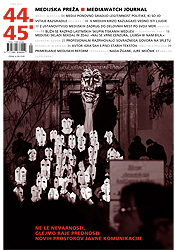
| |
||||
| |
||||
| |
||||
| |
||||
| |
||||
| |
||||
| |
||||
| |
||||
| |
||||
| |
||||
| |
||||
| |
||||
| |
||||
| |
||||
| |
||||
| |
||||
| |
||||
| |
||||
| |
||||
| |
||||
| |
||||
| |
|
|||
Why compare media reforms? It is possible to blame the wrong approach to “media democratization” where the models of media regulation, institutions and professional culture have been simply transplanted and imitated from the Western countries. But is it also possible to blame and question the model itself?  Thematic supplement of the Media Watch Journal #44-45 (PDF) Thematic supplement of the Media Watch Journal #44-45 (PDF)
The initiatives to reform media systems to better serve public interest and democracy, and to better protect citizens’ rights to communication and information are taking place in different regions of the world. Although the general demands are the same, current media reform initiatives have specific contexts, forms and goals in each country. The regional dimension is, however, often relevant since the problems with the media and democracy, and the strategies for media reforms have a certain level of common regional character. The regional view of media reform initiatives is useful in the case of South East Europe, but also in the case of the Middle East and North Africa and the recent developments there, as well as in the case of current and previous structural transformations of media systems in the countries of Latin America. Common to these regions is that the lack of structural conditions for the media to play a normative role is explained as it is connected with their exposure to authoritarian regimes. As such these regions have been subject to media development aid in the forms of support to the development of media regulation, institutions and professional culture, especially in the period of post-authoritarian media transformations. However, the outcome of media system transformation in the post-socialist countries of South East Europe 20 years after the fall of authoritarian regimes shows that something has gone wrong. It is possible to blame the wrong approach to “media democratization” where the models of media regulation, institutions and professional culture have been simply transplanted and imitated from the Western countries. But is it also possible to blame and question the model itself? Media reform initiatives are currently taking place in the countries which have been considered the senders of media development aid, and the models of democratic media systems, such as the UK and the USA. In the case of the UK, both the public service broadcasting (BBC) and the self-regulatory body for print media (Press Complaint Commission) have been used as models during the “media democratization” in South East Europe. But, media reform advocates in these Western countries now use similar criticism of their media systems as those in post-authoritarian societies, claiming that media systems in “traditional democracies” have been captured by particular commercial and political interests. Is it then possible to compare media reform initiatives in different regions of the world, and learn from each other? That question was in the core of the trans-regional conference “Comparing Media Reforms” organized on 29 and 30 November 2012 in Ljubljana by the Peace Institute, aiming to connect the analysts and protagonists of campaigns for media reforms and media system transformations in different regions of the world, beyond the division between “developed” and “non-developed”. Its purpose was to revisit analytical frameworks, learn lessons from successes and failures in the field of the media and democracy in different regions and establish grounds and instruments for trans-regional collaboration and exchange. This thematic supplement of the Media Watch Journal contains most of the contributions and ideas discussed at the conference. Thematic supplement of the Media Watch Journal #44-45 (PDF)
|